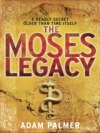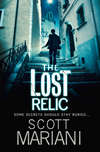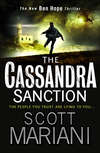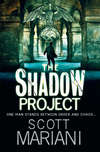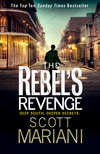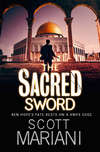Kitabı oku: «The Ben Hope Collection», sayfa 34
Chapter Twenty-Five
Near Ravenna, Italy
When Leigh woke the next morning, Ben was already into his ninth phone call. The local directory didn’t have a listing for a Professor Arno, so he was having to try each Arno in turn. He’d worked his way down half the list before deciding to give up and pay a personal visit to the music institute where the old scholar had taught.
They ate a rushed breakfast in the pensione and drove the Citroën into Ravenna. They parked near the centre and walked through a pedestrian zone over the cobbled streets. It was out of season, and the town was quiet.
Past the Church of St Vitale, the Istituto Monteverdi was a tall and narrow building fronted with white stone columns and a flight of steps. A glass doorway led into a reception foyer. Their footsteps rang off the marble floor and echoed up to a high ceiling. From somewhere above them they could hear a cello playing, and from another room the sound of a woman singing arpeggios to piano accompaniment. The music mixed together in a discordant swirl that reverberated off the stone walls of the old building.
They approached the desk. The receptionist was a steely-haired woman dressed in black. She scowled at them. ‘Can I help you?’
‘We’re looking for Professor Arno,’ Ben said in Italian.
The woman shook her head. ‘Professore Arno does not teach here any longer. He is retired.’
‘Perhaps you could give me his phone number?’ As Ben asked, he knew he’d be refused.
‘We do not give out numbers.’
‘I understand, but this is very important.’
The woman crossed her arms with a severe look. ‘I am sorry. It is not possible.’
Ben was reaching for his wallet. Bribery was always an option, although this one didn’t look the sort. Leigh stopped him. ‘Let me deal with her,’ she said in English.
The woman was staring at them with a hostile expression. Leigh smiled and spoke in fluent Italian. ‘Signora, please call your Director.’
The woman looked shocked. ‘Why?’
Leigh smiled again. ‘Tell him Leigh Llewellyn is here and would like to speak to him. It’s urgent.’
The mention of Leigh’s name had an immediate, almost magical effect. The hostile receptionist was suddenly all smiles and apologies for not having recognized the famous soprano before. She led them up a flight of stone stairs to the first floor.
Leigh caught Ben’s look. ‘What?’ she whispered.
‘Maybe I didn’t make myself clear. I thought we’d agreed you were to keep a low profile.’
‘Can you think of a better way?’
‘I’m sure I could.’
‘Like putting a gun to her head?’
‘Wouldn’t be a bad idea,’ he muttered.
The receptionist hammered on a door and stuck her head through. She fired a burst of rapid Italian that Ben didn’t follow. A man’s voice replied from inside the room. ‘La Llewellyn? Qui?’
The Director burst out of the office. He was a short man, plump and round in a dark suit. He greeted them with furious pumping handshakes and ordered the receptionist to bring coffee and biscuits. ‘I am Alberto Fabiani,’ he said with a broad smile. He couldn’t take his eyes off Leigh. ‘This is a great honour, Maestra. What can I do for you?’
They sat at his desk and Leigh repeated their need to see Professor Arno. Was it possible to be put in contact with him?
Fabiani looked unsure. He breathed in through his teeth.
‘He’s not dead, is he?’ Leigh asked.
‘No, no, he is not dead,’ Fabiani said hastily. ‘Not yet. He lives in the countryside about ten kilometres from here. I will gladly put you in touch with him. But I feel I should warn you…’ The Director paused. ‘Francesco Arno is a good man. In his day, he was thought of as one of the greatest Mozartian scholars of all time. But he is old now. Over the years he has become-how should I say it—strano.’
‘Strange? How?’ Ben asked.
Fabiani shrugged. ‘His beliefs. His obsession. He became more eccentric as time passed, and he clashed more and more with his peers until, frankly, my old friend and colleague was becoming something of an embarrassment to the Istituto. Even the students came to mock him. They would take a delight in winding him up. Once they got him started he would rant on for hours. His lectures became a farce.’ Fabiani smiled sadly. ‘I have to say that I was not entirely sorry when he announced his retirement.’
‘What were these beliefs of his?’ Ben asked.
Fabiani rolled his eyes. ‘If you speak to him, you will find out soon enough.’
Chapter Twenty-Six
Austria
The same morning
The man was solid and powerful. He was an inch under six and a half feet tall and weighed two hundred and sixty pounds-none of it fat. He walked naked to the edge of the springboard, feeling it flex under his weight, and bounced a couple of times. His strong leg muscles hardened. He took a breath and launched himself.
His body hit the water in a perfect dive, hardly making a splash, and he knifed deep into the pool, then surfaced and swam fast. He forced thirty lengths out of himself, then heaved himself out of the water and walked to the chair, where his clothes were lying neatly folded. He was barely out of breath. Through the windows of the indoor pool, the snow-covered grounds of the estate swept away to the pinewoods in the distance.
The man scraped back his sandy hair. He reached for a towel, and as he dried himself he admired his trim shape. His muscled arms and torso bore the scars of nine bullet wounds and three knife slashes. He remembered exactly how and where he’d got each of them. Each had its own story. What they all had in common was that none of the people who’d given them to him had lived for more than three minutes afterwards.
The man was forty-three years old. He was a Londoner by birth and a former British Army soldier. His name was Jack Glass.
When he was drunk he would sometimes boast about his exploits in the legendary SAS. He even had the regimental winged dagger emblem tattooed on his upper right arm. He liked people to see it.
The truth was that he’d been rejected for service in the regiment many years before. A psychological evaluation had exposed certain traits that the regimental heads felt would not be an asset. His unsuitability for the Special Air Service had been confirmed when he’d tried to throttle the officer who’d informed him of his failure to make the grade. He’d been returned to his regular unit in disgrace, court-martialled and kicked out of the army.
He’d drifted around after that, run out of money. Like a lot of army leavers he’d been forced to take on menial jobs for a while. With his court-martial record he couldn’t even get security work.
One rainy London night he’d been at the bar of a pub when he’d met an old contact who had offered him paramilitary work in Africa. The money was excellent and the work was perfect for Glass. He’d accepted immediately and was on a flight three days later. He’d never returned to Britain.
In the Congo, Rwanda, Liberia, he’d worked for whoever paid the most. Suppressed anti-government rebels. Burned schools. Destroyed villages. Executed whole families caught up in bloody tribal wars. He did whatever he was told to do, took the cash and asked no questions.
Liberia was where he’d picked up the scar on his ear. The lobe had been ripped off by a bullet from an AK-47. The person holding the rifle was a black child of nine or ten, a little girl. It was the last round in the magazine of her AK. When she saw him standing there clutching his ear and screaming at her, she dropped the rifle and ran.
Glass had gone after her. He chased the screaming child deep into the bush. Brought her down, knelt on her chest, pinned her arms over her head with one hand. With the other hand he’d drawn out his bayonet, placed the point against her ribs. When he drove the blade slowly deep inside her little body he felt the struggles diminish and saw the life leak out of her eyes.
He could still remember it now. Someday, he’d like to do that again.
After Africa came the Bosnian conflict, where Glass had become involved in gun-running. He quit the battlefields, wore a suit and carried a briefcase instead of an M16. The case was usually filled with banknotes. He discovered you could make more money getting someone else to pull the trigger. Two years later, now a full-blown businessman with a lot of connections and cash rolling in, he’d met and struck up an alliance with an Austrian called Werner Kroll at an arms fair in Berlin.
At the age of thirty-six, Glass had gone to work for Kroll as a personal secretary and general aide. Glass was used to money by now, but selling Kalashnikovs to warring tribes was nickels and dimes next to the things Kroll was into. He was a little more than just an ordinary businessman. But he took fanatical care to cover his tracks, and only a very select few had any notion of the real scope of his activities.
Glass knew a little about the history of Werner Kroll’s family business. It had been around a long time, and had come a long way since its origins. He also knew that Kroll wouldn’t hesitate to have him, or anyone else, killed if they betrayed him or informed on him. The old Austrian was small and looked harmless. He was a little odd in his ways, and he had the air of an old-world schoolmaster. But he was the most dangerous man Jack Glass had ever met in his life, and he’d met a great many dangerous people.
Glass pictured Kroll’s wrinkled, pinched grey face in his mind. One day, he was going to kill the old bastard and fuck that little whore he kept as his mistress.
He dressed in a white shirt and grey slacks, did his tie up loosely and put on his blazer. In his office he found a sheet waiting for him on the fax machine. It was from London. He studied it up close. This was interesting.
Werner Kroll was sitting in his conservatory breakfast room with Eve. He ate in silence with his back to the window and the ornamental lake with the snowy mountains beyond. Kroll had been eating the exact same breakfast every morning for six years, poached eggs with slivers of toast cut into precisely the same sizes, arranged the same way on a porcelain plate. No butter. He ate delicately, almost daintily.
Glass came in carrying a folder. Kroll’s fork halted midway between his plate and his mouth. He dabbed his lips with his napkin and glared at him. ‘I’ve told you not to disturb me at breakfast,’ he said in an icy voice. His nose twitched. ‘My God, man, are you chewing gum again?’
Glass smiled to himself and took the gum out of his mouth. He loved to wind the old man up. ‘Forgive me, sir,’ he said. ‘I thought you might like to see this. It just came through.’ He opened the file and handed Kroll a sheet of fax paper.
Kroll put on a pair of half-moon spectacles and peered down his nose at the sheet. It was a copy of the front page of last night’s Evening Standard. It showed a grainy photo of Leigh Llewellyn surrounded by fans. Kroll recognized the Oxford landscape, the Sheldonian theatre behind her. To her left stood a man he hadn’t seen before. They were holding hands. The headline read ‘WHO’S LEIGH’S LEADING MAN?’
Kroll lowered the sheet and looked at Glass over the top of his lenses. ‘Is this the person who killed one of our best men with…what was it?’
‘A skillet, sir,’ Glass said.
Eve picked up the sheet and peered at the man in the photo. She liked the look of him, tall and fit-looking. Glass was watching her face.
‘I would also like to find out who Leigh’s leading man is,’ Kroll said. He glanced at Eve. She’d been looking at the picture a moment too long. He snatched it away from her.
‘I think I know who he is, sir,’ Glass said.
‘A professional bodyguard?’ asked Kroll.
‘I think he might be a little more than that,’ Glass said. ‘I’ll have to check my contacts. It might take a few days. But I’m certain it’s him.’
Kroll dismissed him and went back to his eggs. They were cold. He pushed them away in disgust.
Eve was heading back to her room after breakfast when she met Glass in the corridor. He was standing at her doorway, leaning casually against the wall with one big hand against the door-frame.
She stopped and looked at him. ‘Aren’t you going to let me through?’
He grinned, eyeing her up and down. She tried to shove past him. His powerful hand gripped her arm and he whirled her around.
‘Get your paws off me,’ she warned him.
Glass pulled her closer and roughly fondled her breasts through her blouse. ‘Nice.’
She tore away from him and slapped him across the face, felt the hardness of his jaw against her hand. Her palm stung.
Glass smiled. ‘I’m watching you,’ he said. ‘I know what you want.’
‘Do you really?’
‘Once a whore, always a whore. You want to fuck a real man for a change?’
‘If I can find one,’ she said.
‘You’ve got one right here.’
‘In your dreams.’
Glass’s smile stretched into a grin. ‘One day, bitch. One day soon.’
Chapter Twenty-Seven
Italy
Later that day
Professor Arno invited them into a large, sunlit study and offered them a glass of grappa. His English was heavily accented but fluent. He walked with a stick and the ancient tweed jacket was two sizes too large for him. His movements were slow and his frail hands shook slightly as he poured the drinks from a crystal decanter, then took off his jacket and hung it on a hat stand. He motioned them to a cluttered desk that sat in front of a pair of arched windows overlooking the villa’s pretty gardens.
The study was filled with a heavy, sickly vanilla-like smell from the three large scented church candles burning in an antique silver candle-holder. The elderly professor walked stiffly around the desk and lowered his wiry frame into a button-leather chair with his back to the windows.
Ben and Leigh sat facing him. Ben drank the burning spirit down and laid his empty glass in front of him on the desk. Leigh took a tiny sip and cradled her glass nervously on her knee, preparing in her mind what she wanted to say.
The professor leaned back in his chair, his wispy white hair silhouetted against the sunlight streaming in through the glass. He watched Leigh for a few moments with a glimmer in his eye. ‘I heard you sing Lucia di Lammermoor at the Rocca Brancaleone,’ he said to her. ‘I thought you were magnificent, the greatest Lucia since Maria Callas.’
Leigh smiled graciously. ‘Thank you, Professor. That’s a great compliment, and I’m sure I don’t deserve it.’ She paused. ‘But unfortunately we didn’t come here to talk about opera.’
‘I did not think you had,’ the old man said.
‘I believe my brother Oliver came here to see you last winter. What can you tell me about his visit?’
‘I found him a charming young man,’ Arno said sadly. ‘We got on very well. He only planned a short stay, but we talked for many hours. In the end he remained here for nearly two whole days. I was very impressed with his passion for music. He played for me, pieces from the Goldberg Variations and some Clementi sonatas. A gifted pianist. His Clementi interpretation was very nearly in the same league as Maria Tipo, in my opinion.’
‘He was here to discuss the research for his book,’ Leigh said.
‘Yes. Oliver asked me to clarify certain things that were unclear to him.’
‘Things about the letter?’ she asked.
The professor nodded. ‘The Mozart letter I obtained from your father long ago. Your brother had a photocopy that your father had made of it, but he could not understand its full and true meaning.’
‘Do you know what happened to Oliver shortly after you saw him?’
Arno sighed. ‘I know that he went to Vienna.’
‘Where he was killed. I believe he was murdered.’
Arno didn’t look surprised. He nodded. ‘I feared as much.’
‘Why did you think that?’
‘I received an email message from him. He told me he needed very urgently to talk to me, that he had made a discovery, and that there was danger.’
‘When was this?’
‘The night he died, I believe. I was very sorry to hear of his death.’ Arno shook his head sadly.
‘What kind of danger did he say he was in?’ Ben asked.
‘He did not say. The message seemed to have been written in a hurry.’
Ben glanced at the computer on the old man’s desk. ‘Do you still have that email?’
‘I deleted it immediately after reading it.’
‘You realize that information would have been very important at the inquest into the cause of Oliver’s death?’
‘Yes,’ Arno said softly.
‘But you decided to keep it to yourself that the circumstances might have been suspicious-that it might not have been an accident?’ Ben felt his face flush. Beside him, Leigh was staring at her hands on her lap, and he worried that he was pushing the old man too hard.
Arno sighed heavily and ran his fingers through his thin white hair. ‘I am not proud of what I did. I had my suspicions but no proof. There was a witness to the accident. Who would have believed a crazy old Italian with the reputation of a crank, a conspiracy theorist?’ He paused. ‘And I was afraid.’
‘Afraid of what?’ Leigh asked.
‘That I was also in danger,’ Arno replied. ‘Soon afterwards, intruders came in the night.’
‘Came here?’
‘Yes. I was in the hospital. My blood-it is not healthy. When I returned home, I found that the house had been ransacked. They were searching for something.’
‘What were they searching for?’ Ben asked.
‘For the letter, I believe.’
‘Did they steal it?’
‘No,’ Arno replied. ‘After your brother sent me the message, I put the letter somewhere very secret. Somewhere nobody could ever find it.’
‘May we know where it is?’ Ben asked.
Arno smiled. ‘It is safe,’ he said softly. ‘It has gone home.’
Ben wondered what he meant by that.
Arno went on. ‘But for a long time I myself did not feel safe,’ he said. ‘I felt I was being watched. It went on for months.’
‘I think the letter had something to do with Oliver’s death,’ Leigh said.
The professor looked grim. ‘You may be right.’
‘Can you explain?’
Arno hesitated as he gathered his thoughts. ‘I think I had better start at the beginning. As you know, the subject of your brother’s book was one that I have been studying for many years.’
‘Mozart’s death,’ Leigh said.
‘Not just Mozart’s death, but the events that led up to it, surrounded it and may have caused it…I believe did cause it. For this, we have to go back to the eighteenth century…’
‘With respect, Professor,’ Ben said. ‘We didn’t come here for a history lesson about someone who died over two hundred years ago. We want to know what happened to Oliver.’
‘If you hear me out,’ Arno replied, ‘I think what I tell you may help you understand.’
‘Oliver told me he was doing a lot of research into Mozart and the Freemasons,’ Leigh said.
Arno nodded. ‘It is no secret that Mozart was a Freemason himself. He joined his Lodge in 1784 and remained a Mason until his death seven years later, during which time it is said he rose to the level of Third Degree, Master Mason. Mozart was so dedicated to Freemasonry he even persuaded his father Leopold to join them. He supplied music for Masonic events, and had many friends who were Initiates.’
Ben shifted impatiently in his seat. ‘I don’t understand why this is so important.’
Leigh laid a hand on his arm. ‘Go on, Professor.’
‘Today we think of Freemasonry as something of a joke, or at best a social club like the Rotarians,’ Arno said. ‘But in eighteenth-century Europe it was an extremely important cultural and political force. In 1780s Austria, Freemasonry was a meeting point for the intellectual elite, an important centre for ideas of peace, freedom, and equality. The Masonic Lodges of Vienna comprised many of the most influential names of the time. Many aristocrats, senior politicians and diplomats, high-ranking military officers, bankers and merchants. There were also many intellectuals among them, writers, artists, musicians.’
‘I didn’t know they were so powerful,’ Leigh said.
Arno nodded. ‘They were, but their power was also their undoing. Other forces, even more powerful, were watching with a close eye. In fact, much of our modern knowledge of the Viennese Masons at this time comes from the intelligence material gathered by the Austrian secret police. Freemasonry was officially condemned in the Austrian Empire on the orders of the Pope, and only allowed to exist because of the tolerance of the Emperor, Josef II. But in 1785 Josef’s sympathy grew thin, and he decided that the Masons had become too powerful and influential. He ordered a drastic reduction of the Viennese Lodges, and demanded that the secret police provide him with lists of active Masons. These lists were kept in the files of the court archives.’
‘Why the sudden sea-change?’ Leigh asked.
‘You have to understand the climate of the times,’ Arno explained patiently. ‘Mozart lived in a turbulent age, a revolutionary age. The Americans had only recently overthrown their colonialist British rulers and established a new free nation. Revolution was in the air. By 1789, just two years before Mozart’s death, France stood on the verge of terrible bloodshed.’
‘And the Masons were involved?’
‘Masonry was increasingly associated with the growing revolutionary, anti-royalist current,’ said Arno. ‘With its ideals of liberty, equality and fraternity, it offered a perfect metaphor for the dawning of a new age of free ideas. As the French Revolution gathered steam, some of the revolutionary “clubs”, such as Robespierre’s Jacobins, based their structures on the Masonic Lodges, as well as importing Masonic symbolism into their political ideology. In America, when George Washington laid the foundation stone of the Capitol in Washington he wore with pride the Masonic apron that had been made for him by Adrienne, the wife of the French soldier-revolutionary La Fayette. Thomas Jefferson was another Freemason who drew heavily on those ideals of liberty and equality when he drafted the Declaration of Independence. It was a hugely powerful force with the potential to influence political change across the world.’
‘And so, naturally, it had to be stopped,’ Ben said.
‘Without question,’ replied Arno with a bitter smile. ‘By the late 1780s there were growing concerns in Mozart’s Austria that the Masons were going to plunge the country into the same revolutionary, pro-republic spirit as France and America. It was a dangerous time. Many aristocrats who had initially sympathized with Freemasonry’s ideals began to worry. Then, as the revolutionary mobs tore through France and the aristocracy went to the guillotine, the Austrian clampdown on Freemasonry began in earnest. By 1791 Masonry in Austria was virtually wiped out. It was a period of severe crisis for Mozart and his Lodge brothers.’ He paused. A new Emperor had taken over, Leopold II. The Masons could not tell what his attitude would be to them, but they were not optimistic. Then Mozart and his close colleague, the theatrical producer and fellow Mason Emanuel Schikaneder, had an idea.’
‘What idea?’ Ben asked.
‘They thought that if they could rescue the public image of the Masons, they might help to save the Craft from universal condemnation,’ said Arno. ‘What they did would nowadays be called a huge publicity stunt. They conceived of a grand opera that would reach out to an audience of unprecedented scale. A spectacle that everyone would love, written in popular style. A people’s opera preaching Masonic ideals of the education of men to a higher morality through wisdom, love and goodness, heralding the transition to a new social order. Full of mystical symbols glorifying the Freemasons and their philosophy.’
‘The Magic Flute’, Leigh said.
Arno nodded. ‘The new opera had its premiere performance in Vienna at the end of September 1791. It was received with rapturous enthusiasm by the public and the critics, and played to packed theatres night after night.’
‘It was the most successful thing Mozart had ever done,’ Leigh added.
‘Yes, it should have been the start of a new era for him,’ Arno replied. ‘And it was welcomed by his fellow Masons as a new hope for their Craft. But it was the last opera he would ever compose. Within less than three months, he was dead.’
‘Wait a minute,’ Ben said. ‘Leigh, didn’t you tell me that Mozart had been murdered by the Masons because he’d given away their secrets in The Magic Flute?’
‘That’s what I thought—’
‘Well, that doesn’t make sense, does it?’ Ben continued. ‘If Mozart was becoming this great new hope for the Masons, their public relations man at a time when they needed him most, then why kill him?’
Arno smiled. ‘You are right. This theory is completely illogical. Likewise, the fact that after Mozart’s death his fellow Masons gave his widow Constanze a great deal of moral and financial support makes nonsense of the idea that he was murdered by his own.’ Arno turned to Leigh. ‘Your brother had noticed these inconsistencies early on in the course of his research. Oliver knew that there was no satisfactory explanation for the strange and sudden death of Mozart.’
‘Unless he wasn’t murdered at all,’ Ben said. ‘How do we know there’s any truth in this murder conspiracy theory?’
‘The official cause of death was acute rheumatic fever,’ Arno replied. ‘However, many of those around him at the time found the circumstances of his passing highly suspicious. Towards the end of his life, Mozart often expressed his conviction that he would be poisoned one day-yet the scholars have never bothered to examine this properly. His elder son, Carl Thomas Mozart, also had strong suspicions that his father had died by foul means. The body displayed unusual characteristics consistent with death by poisoning.’ Arno shrugged. ‘Based on the medical records of the time, nobody can disprove that Mozart was poisoned. But the single most important piece of evidence is the letter itself.’
‘What does it say?’ Leigh asked.
Arno looked surprised. ‘You have not seen it?’
‘I had Oliver’s copy but it got burnt,’ Leigh said. ‘All I’ve seen of it are a few fragments.’
‘But surely your father showed it to you?’
‘Professor, I was only nineteen years old. I had other things on my mind.’ She glanced at Ben. ‘I don’t remember much about it.’
‘I see…’ Arno paused and scratched his chin. ‘So you are not familiar with the Order of Ra, to which the letter refers?’
Ben remembered it from Oliver’s notes. He thought for a moment. ‘Ra as in the Egyptian sun god Ra?’ he asked.
Leigh turned to stare at him.
He caught her look. ‘Theology,’ he said. ‘Student days.’
‘You studied Theology?’
‘It was a long time ago.’
Arno smiled. ‘You are correct, and many of the ceremonies and traditions of Freemasonry can be traced back to ancient Egypt. But Ra also means King. It is sometimes written as Re, and is the origin of the word Rex in Latin and your English words regal and royal’.
‘So what was this Order of Ra?’ Ben asked.
‘The Order of Ra was originally a small and obscure Masonic Lodge,’ Arno answered. ‘Their members were largely aristocratic and pro-royalist, and they gave their group a name that would reflect their political leanings: for them it signified the Order of the King. They were far divorced from the growing republican spirit within Freemasonry, and became increasingly allied to the establishment powers as the perceived threat from the Masons grew. While Freemasonry stood for freedom, democracy and the people, the Order of Ra stood for the complete opposite. They were warmongers, fervent capitalists, an agency founded to aid elitist governments in suppressing the people.’
‘A kind of rogue splinter group, then,’ Ben said.
‘Exactly,’ Arno replied. ‘And an extremely powerful one, with lofty connections. The Order of Ra meddled in many political intrigues, not least of which was to put pressure on the Emperor of Austria to ban the rest of Freemasonry outright, even on pain of execution.’
‘Let me get this right,’ Leigh said. ‘You’re suggesting that the Order of Ra killed Mozart because he was popularizing Freemasonry through his opera The Magic Flute?’
The professor’s eyes glittered. ‘That is what I believe. And I believe the letter proves it. Mozart was a potential threat to them. If he could restore public support for Freemasonry, he could be dangerous. He was a rising star, a meteoric talent just beginning to shine. The massive success of The Magic Flute had given him great prestige. He had only just been appointed to a prominent post at the Court, and had the Emperor’s ear.
‘But his enemies were rising up too. By 1791 the members of the Order of Ra were fast becoming a major executive branch of the secret services. Their agents were brutal, violent and ruthless, and their Grand Master was none other than the Head of the Austrian secret police. He was a callous murderer, sworn to destroy the Masons.’
Ben was about to ask the man’s name, but Arno carried on.
‘By 1794, just three years after Mozart’s death, Masonry in Austria had effectively been obliterated. Many murders were committed-some openly, some less openly. Poisoning was one of their most common means, and would have been the most suited to disposing of someone of Mozart’s increasing celebrity status. They had to be careful. Other, more obscure, Masons met with a far more violent end. Gustav Lutze, for instance.’
‘Who was he?’ Leigh asked.
‘He was the man Mozart wrote the letter to,’ Arno said. ‘A member of the same Viennese Masonic Lodge, Beneficence. Mozart was writing to warn him of the growing danger. The letter is dated the sixteenth of November 1791, and is perhaps the last one he ever wrote. Of course, the so-called experts believe that his last surviving letter was the one he wrote to his wife on the fourteenth of October, while she was away taking the waters in Baden. Idiots. In any case, the letter never reached its destination; it was too late.’



